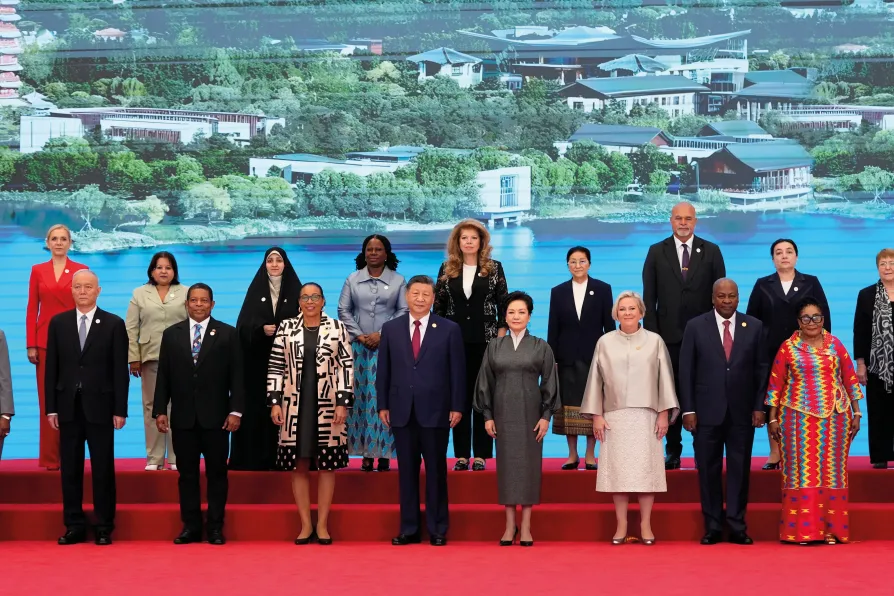Rubio's disturbing speech in Munich exposed the West's brutal plans — more imperialism, more colonialism, more white supremacy, says ROGER McKENZIE
As the Global Leaders’ Meeting on Women begins in Beijing, it’s clear that China has fulfilled its commitments set 30 years ago and delivered amazing progress in women's education and equality, writes YU BOKUN

 LEADING THE WAY: China’s President Xi Jinping, centre left in front, and his wife Peng Liyuan, centre right in front, pose for a group photo with national leaders and delegations before an opening ceremony of the Global Women’s Summit 2025 at the China Na
LEADING THE WAY: China’s President Xi Jinping, centre left in front, and his wife Peng Liyuan, centre right in front, pose for a group photo with national leaders and delegations before an opening ceremony of the Global Women’s Summit 2025 at the China Na
AN OLD Chinese saying goes, “Women hold up half of the sky.” But holding the sky isn’t just about recognition, it’s about opportunity. And the foundation of that opportunity is education.
Building on decades of progress, China will host the Global Leaders’ Meeting on Women in Beijing to mark the 30th anniversary of the 1995 World Conference on Women. The summit will highlight the country’s achievements in advancing women’s education and promoting gender equality, showing how far women’s opportunities have expanded over the years.
The latest white paper, China’s Achievements in Women’s Well-Rounded Development in the New Era, shows the country has made huge strides in promoting equal education.
The gender gap in basic education has been basically eliminated. Over 99.9 per cent of the primary school-age girls are enrolled. In higher education, the proportion of female students has reached 50.76 per cent, an increase of 14 percentage points from 1995.
The progress reflects decades of steady policies, from compulsory nine-year schooling to broader university access. In 2017, China made safeguarding equal education rights for women and children a key goal of the 13th Five-Year Plan (2016-20) period.
The 2021 Outline for the Development of Chinese Women further supported education at all levels, and the 2022 revision of the Law on the Protection of Women’s Rights and Interests introduced, for the first time, a lifelong learning system for women.
Investing in girls’ education isn’t just right, it’s smart. The World Bank estimates that 12 years of education for all girls could add $15 trillion to $30tn in global lifetime earnings. Educated women are more likely to participate in the workforce, earn higher wages, and contribute to household income, which in turn fuels economic growth.
Each additional year of schooling increases women’s earnings worldwide by an average of 10 to 20 per cent, and raises a country’s per capita GDP growth rate by about 0.1 to 0.3 percentage points, said An Xuxin, an assistant researcher at the China Institute for Education and Social Development of Beijing Normal University.
“Women who receive education can create a ‘mother effect.’ This means their choices in childbirth, taking care of family health, and raising children can greatly enhance population quality and promote long-term economic growth,” she said.
Providing girls with more access to education doesn’t just boost the economy; it also saves lives, reducing child marriage rate, HIV rate, and infant mortality.
I personally experienced this when registering for maternity nursing, when the doctor asked me about my education level — which reminded me how education shapes maternal knowledge and care. Studies have repeatedly shown that even completing primary education can significantly enhance a mother’s parenting abilities and improve the health of infants.
Despite these advances, challenges remain. A UN report states that roughly 40 per cent of countries still lack gender equality at the primary school level.
In China, rural girls face a higher risk of dropping out of school due to economic pressure, early marriage, or household labour demand. At schools, girls often outperform boys, yet they’re still underrepresented in science, technology, engineering and maths.
Education isn’t just about classrooms; it’s about breaking the cycle of poverty, dreaming bigger, and shaping the future. When a girl is given the opportunity to learn, she elevates her family, her community, and ultimately, the world.
Yu Bokun is an economics commentator for CGTN. The views expressed in this article are the author’s own and do not necessarily reflect those of CGTN.

What’s behind the stubborn gender gap in Stem disciplines ask ROX MIDDLETON, LIAM SHAW and MIRIAM GAUNTLETT in their column Science and Society












